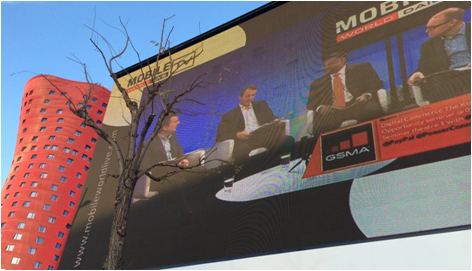 Barcelona is Mobile. The great mobile world exhibition has not gone unnoticed to the city. With a record 100,000 visitors, the Mobile World Congress took place last week in Barcelona, under the theme “Mobile is everything”. Considering the innovations presented in it, it appears that healthcare is also becoming mobile (mhealth).
Barcelona is Mobile. The great mobile world exhibition has not gone unnoticed to the city. With a record 100,000 visitors, the Mobile World Congress took place last week in Barcelona, under the theme “Mobile is everything”. Considering the innovations presented in it, it appears that healthcare is also becoming mobile (mhealth).
The massive mobile technology world fair gathered mobile operators, technology manufacturers, providers, distributors, and content providers who presented the industry’s latest innovations. According to Genís Roca (@genisroca), the contents of this year’s Mobile World Congress has turned around these 6 topics:
1. Graphene
2. Virtual reality
3. eSim
4. Connected Car
5. 5G
6. Internet of Things – IoT
Three of these large trends have very clear applications in the field of healthcare.
The first topic is graphene. The Catalan Institute of Nanoscience and Nanotechnology (ICN2), in collaboration with research centres from Barcelona and the Autonomous University of Barcelona, has presented a group of graphene electronic sensors that can be used to detect the electrical activity of the brain. The early detection of an epileptic crisis could be possible in patients suffering from epilepsy and implanted with these sensors. The implanted device on the cortex would alert the patient by, for instance, sending an alarm signal to an external mobile device.
Virtual reality has been the main character in the congress, or at least, the one that caused more anticipation. This was best seen in the long queues to visit Samsung’s roller coaster or SK Telecom’s submarine.
 Virtual reality applications are starting to appear in the field of mental healthcare. Thus, startups such as MindWave (with their project HealthVR) or Psious offer treatments to tackle phobias, fears or generalised anxiety by exposing patients to virtual reality images, in some cases as part of a cognitive behavioural therapy.
Virtual reality applications are starting to appear in the field of mental healthcare. Thus, startups such as MindWave (with their project HealthVR) or Psious offer treatments to tackle phobias, fears or generalised anxiety by exposing patients to virtual reality images, in some cases as part of a cognitive behavioural therapy.
Finally, the Internet of Things is gaining ground: Internet connected objects are creating new business models and involve more and more sectors. For instance, the monitorisation of vital signs (weight, glucose, blood pressure, physical training, etc.) is increasingly more common with connected wearables (smartwatches, bracelets, etc.) that allow to collect real time data. Connected devices also allow the control and follow-up of chronic diseases, such as diabetes with Insulclok.
The mobile industry will undoubtedly continue to evolve, and its applications in the field of healthcare will grow even more. I was lucky to attend the course Mobile Thinking Days-Digital Health (organised by Mobile World Capital Barcelona, IESE Business School and RocaSalvatella), and one of the key messages that appealed to me is that any product subjected to digital pressure will end up transformed into a service (Genís Roca dixit). Therefore, a big challenge of mhealth will be to offer disruptive, quality services that meet the patients’ needs.
 Entry written by Elena Torrente (@etorrente), digital health coordinator in DKV Services.
Entry written by Elena Torrente (@etorrente), digital health coordinator in DKV Services.
